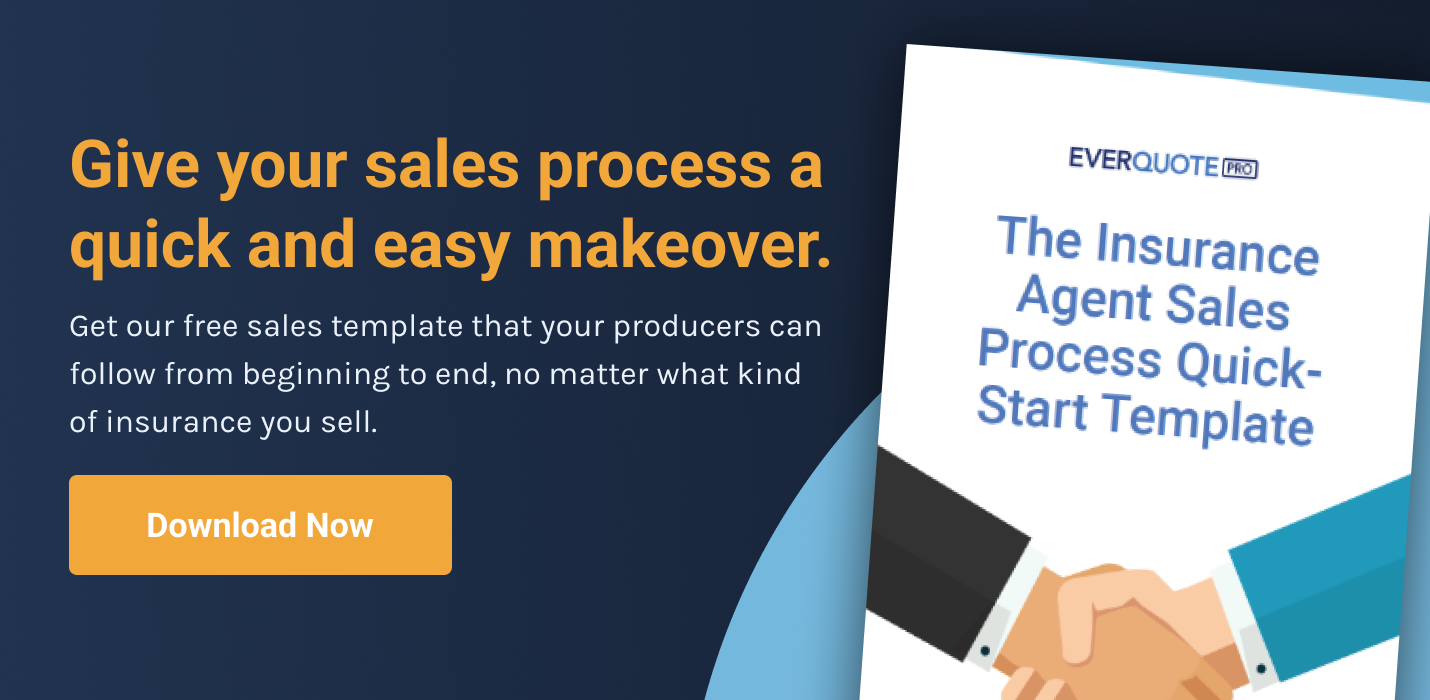

How would you like to sustain your entire agency on referrals alone? For some insurance agents, this isn’t just a dream. They’ve built a successful business around customer referrals, which they use to drive new leads and build their agency book of business. To help get your own insurance referral program off the ground (or to revamp your existing one), take a look at the Q&A’s below that cover the basics.
Often referred to simply as a “referral” in the insurance world, an insurance referral occurs when an existing client of your insurance company provides you the name and contact information of a prospect—a potential customer who may be interested in purchasing insurance from you.
Ideally, your level of service creates such a great experience for customers that they want to tell their friends about it. Unfortunately, as I’m sure you already realize, it's not always quite so simple. Sometimes even with amazing service and happy customers, you still have to motivate current customers to go out of their way to give you referrals. (Tweet this!)
Referrals are the most coveted way to gain business in the sales world for several reasons:
That motivation we referred to earlier sometimes comes in the way of an insurance referral fee. You thank customers for sending you new referrals with a bonus, finders fee, or other type of payment. Gift cards are a popular way of rewarding customers for referring new business.
One of the most effective referral fee systems I’ve seen is to give customers a small monetary incentive for sharing referral names along with introductions, and then offer them an additional bonus for every new client who signs up. For example, you can send a $5 gift card for every new name you get along with an email introduction, and a $25 gift card for each person who buys a policy.
For agents, gift cards are a great way to reward clients who refer business your way; plus, people like money in their pocket, and they can spend the cards anywhere they want.
It’s important to point out that there are a range of different laws depending on what state(s) you do business in. In many States, agents can pay a customer a “finder’s fee” for a referral, but they cannot pay a referral fee to another licensed agent, as it would be considered to fall under the rubric of “commission splitting.” It’s extremely important that you are aware of the relevant laws in your state regarding referral payments and abide by them.
Incentive programs only work if you can track them properly. The simplest way to do that is with an insurance referral form. An insurance referral form is simply a way for you to track incoming leads referred from existing customers. It can be a free Google Form that you send to clients to fill out. One of the benefits of using Google Forms is that they autoload and prefill data into a Google Sheets spreadsheet for free.
The best tool for you is one you’re probably already using—Excel or Google Sheets. They are both popular spreadsheet programs that many agents use to keep track of customers, policies, and other important information.
The easiest way to set up a home or auto insurance referral program inside a spreadsheet is to add start dates for all your new customers, so you know when to reach out to them and ask for referrals. If you use a calendar platform like Google or Outlook Calendar, when you enter a customer's start date you can simply set a reminder to contact them 3 months out.
You can also add that you’re looking for referrals in your email signature and newsletters. Don’t forget to mention it on all your social media accounts, too, and consider creating campaigns to promote your referral efforts.
An effective home or car insurance referral program requires a system that will help you keep track of obtaining, tracking and rewarding customers. Keep in mind that customers tend to refer people who are similar to them. This means they may work in the same field, drive similar cars, have similar backgrounds (financial and marital status), and live in the same zip code. One of the ancillary benefits of setting up an insurance referral program is that you’ll often be able to write similar policies and save time.
Unfortunately, there’s no surefire method for getting instant referrals. However, you can increase your chances of getting recommendations by providing unbeatable customer service and showing a genuine interest in your current clients. Reach out to them and show them you care. Check in on them every three months just to make sure everything's going okay. And of course, don't forget to ask your best customers if they have any friends or family who might be looking for a better insurance policy. Just checking in regularly and asking for referrals are incredibly simple ways to help kickstart your referral program.
If you want to boost your insurance referrals, start by creating better relationships with your existing customers. The more often you reach out to them in a helpful way, the more likely they’ll be to renew their policies and send new business your direction.
If you’re still looking to increase your client base, talk to us at EverQuote. We provide high quality leads that are delivered in real-time and are never recycled, which means you have the best chance to reach out to people who actually intend to buy insurance, and who fit your insurance model. We tap the internet to find you customers who can bring in real business, real growth, and real ROI.


As Manager of EverQuote's team of Accelerated Growth Program Business Consultants here at EverQuote, Lee's primary focus has been managing the team of Business Consultants who on-board our agents and help them successfully drive ROI. He holds a B.S. in Finance and Marketing with a Minor in Applied Data Science from Case Western Reserve University's Weatherhead School of Management and came to EverQuote from Criteo in Boston.

You can’t run a successful agency without getting to know people.
If you sell insurance, networking.

For insurance agents, retaining a current customer is less costly and less time-consuming than.

If you’re a P&C agent, you’ve probably built your agency on auto or home insurance sales. There’s.

In the grand scheme of digital insurance agency marketing, paid advertisements might seem like a.

If you’re at all familiar with digital marketing—maybe you’ve dabbled in it a bit or even just done.

Scott Grates, insurance agent and co-founder of Insurance Agency Optimization, is renowned for his.

When it comes to nurturing your insurance agency’s online business reputation, there are numerous.

If the year 2023 had a buzzword, that buzzword was definitely AI. Artificial intelligence took off.